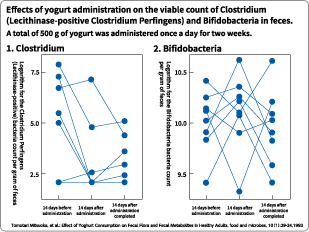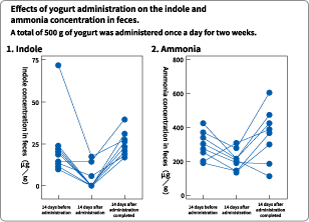Improvement of intestinal flora and constipation by lactic acid bacteria
Consumption of yogurt made from LB81 lactic acid bacteria* reduces bad bacteria and increases good bacteria, while improving intestinal flora overall.
In a study jointly conducted by Meiji Co., Ltd. and the Laboratory of Food Hygiene at Nippon Veterinary and Life Science University, healthy adult subjects were fed yogurt made from LB81 lactic acid bacteria and were monitored for changes occurring in their intestinal microbiota and the amounts of harmful substances produced in their intestines.
The study revealed that LB81 lactic acid bacteria effectively improved the balance of the gut environment by suppressing bad bacteria while causing the proliferation of good bacteria in the intestinal microbiota (population of various microorganisms inhabiting the intestines).
In this study, eight male subjects aged between 38 and 59 years were fed 500 g of yogurt made from LB81 lactic acid bacteria every day for two weeks, and were asked to record in a survey form their self-reported data during the period, including when and how much yogurt they ate each day, their physical condition, quality of their stools (hard, medium, or soft), the number of times they passed stools, and their color and odor (improved, unchanged, or worsened).
The subjects’ stool samples were also collected at three different times, before, during, and after they ate, and were analyzed for bacteria flora and putrefactive metabolites.
In the self-survey forms, all eight subjects reported normal stool condition and stool frequency, along with sound physical condition, during the period they ate yogurt made from LB81 lactic acid bacteria. In addition, seven of the eight subjects reported improved stool odor.
*The yogurt made from LB81 lactic acid bacteria that was fed to the subjects in the study was a plain yogurt fermented with Lactobacillus delbrueckii subsp. bulgaricus 2038 and Streptococcus thermophilus 1131.
If a person stops consuming yogurt, the gut environment will return to its previous condition.
That’s why it is important to keep eating yogurt.

|
 |
As for the specific change observed in the fecal microbiota composition of the subjects eating yogurt made from LB81 lactic acid bacteria in this study, the population of “bad” Clostridium bacteria declined (Figure 1-①), while the subjects that initially had a relatively small population of “good” bifidobacteria in their intestines showed a significant increase in their numbers (Figure 1-②).
|

|
 |
In addition, the yogurt consumption apparently suppressed the generation of putrefactive metabolites overall, in terms of the amounts of ammonia, phenol, p-cresol, indole, skatole, etc. detected. In particular, seven of the eight subjects showed significantly reduced amounts of ammonia and indole compared to before they started taking yogurt (Figure 2).
Furthermore, while the putrefactive metabolites decreased with yogurt consumption, they roughly returned to their previous levels before taking yogurt, by two weeks after stopping consuming the yogurt made from LB81 lactic acid bacteria.
This study confirmed that the LB81 lactic acid bacteria’s suppression of bad bacteria and proliferation of good bacteria improve the gut environment in healthy adults and reduce the putrefactive metabolites. The study also revealed that once the consumption of yogurt made from LB81 lactic acid bacteria stops, the gut environment returns to its former condition. This shows the importance of continuing to consume yogurt.
|





